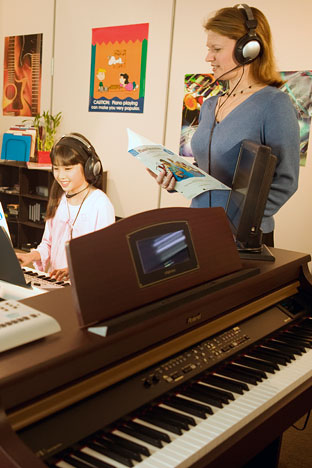Creative Solutions For Inspired Learning
Menu
Creative Solutions For Inspired Learning
Menu
A music technology lab course or tech ensemble is a great way to attract and involve students in your music program who aren’t enrolled in existing music classes such as band, choir, orchestra, or general music. While these classes can still form the core of your music curriculum, adding music classes with more of a technology focus can increase the size of your program with a population of students who like music, but typically aren’t interested in the traditional music faire.
The roles of those involved in creating, performing, and recording music has changed dramatically. The traditionally separate functions of composer, musician, engineer, and producer are being blended so that in many project studios one person performs all of these roles. This is having a tremendous impact on the way our students can create music. Equipped with a computer, music software, and a synthesizer, students can produce an entire music score or record a CD in their own bedroom at home. The days of needing a large, very expensive recording studio to record and produce high-quality sounding music no longer exist.
A music technology ensemble can open up new performance possibilities for students. In a typical music program, students who play piano, keyboard, or guitar have limited opportunities to perform in the band, orchestra, or choir. The keyboard emphasis — common in an electronic instrument ensemble — especially benefits piano students who traditionally learn and perform in a solo environment.
In addition, there are frequently many other students who have an interest in the technical side of music production, but lack performance skills. Enlisted into an ensemble that uses electronics, they can make excellent sound techs setting up gear, controlling the mixer, and troubleshooting problems. These students can also make great tech lab assistants, technicians or music department webmasters.
With the widespread use of electronics in the music industry, music technology provides a connection for students between school and the music industry. Although the primary purpose of music education shouldn’t be for career training, and most students in a music program may not pursue a career in music, technology opens the doors for many other opportunities in music and music-related industries. While most music programs prepare students for possible careers in traditional music performance or music education, technology integration can expose students to a wide range of other music-related careers. Many young people are interested in a curriculum that is more relevant and in tune with the production, performance, and current trends prevalent throughout much of the modern music world. These include computer applications, sound design, recording and sound engineering, project studios, music business, and performing contemporary music.
As the world of making music changes, students change and teachers must change with them in order to guide them toward satisfying life decisions. For the student who has the drive to pursue a career in music, exposing them to all the possibilities may be what it takes to help him reach that goal.